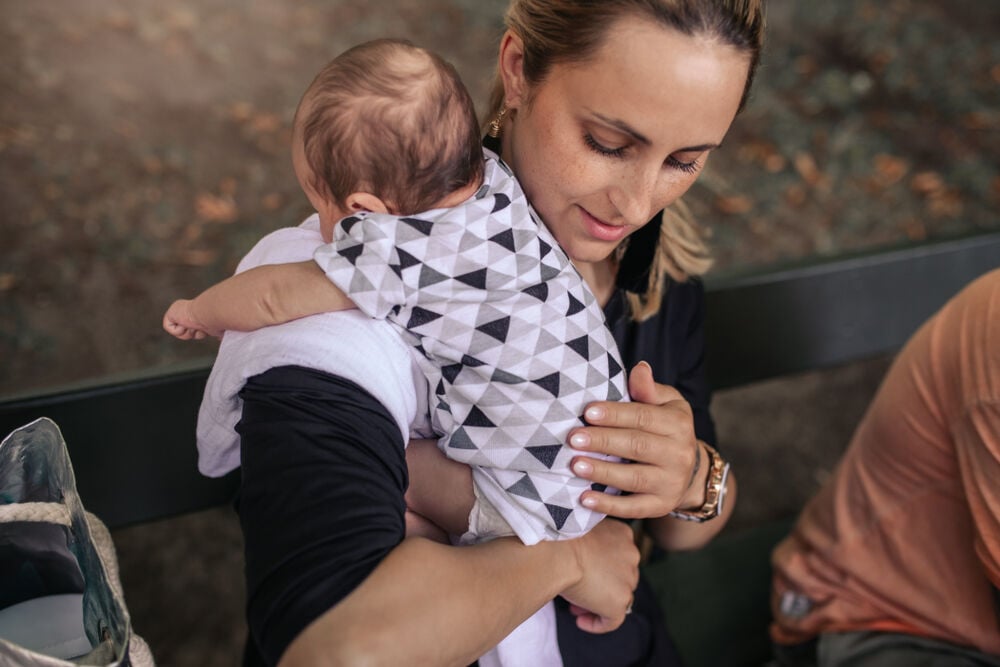-
Tracking cycle
-
Getting pregnant
-
Pregnancy
-
Help Center
-
Flo for Partners
-
Anonymous Mode
-
Flo app reviews
-
Flo Premium New
-
Secret Chats New
-
Symptom Checker New
-
Your cycle
-
Health 360°
-
Getting pregnant
-
Pregnancy
-
Being a mom
-
LGBTQ+
-
Quizzes
-
Ovulation calculator
-
hCG calculator
-
Pregnancy test calculator
-
Menstrual cycle calculator
-
Period calculator
-
Implantation calculator
-
Pregnancy weeks to months calculator
-
Pregnancy due date calculator
-
IVF and FET due date calculator
-
Due date calculator by ultrasound
-
Medical Affairs
-
Science & Research
-
Pass It On Project New
-
Privacy Portal
-
Press Center
-
Flo Accuracy
-
Careers
-
Contact Us
Baby Burping 101: Parent-Approved Tips and Techniques


Every piece of content at Flo Health adheres to the highest editorial standards for language, style, and medical accuracy. To learn what we do to deliver the best health and lifestyle insights to you, check out our content review principles.
Why burping a baby is important
A burp is essentially the discharge of air or gas through the esophagus and mouth.
Despite the benefits of breastfeeding, a certain amount of gas is bound to get trapped in your newborn’s tiny stomach in the process. The natural breaking down of particles which occurs during digestion forms gas bubbles. (Dairy intolerance has been known to have a similar effect.) Burping a baby is therefore necessary for releasing these bubbles which cause them to squirm and fuss after a big meal.
To reduce the likelihood of pain and discomfort for your child, experts recommend burping a baby before they’ve gotten cranky. In fact, it should become an integral part of your daily feeding routine.
Note that your little one’s burp could occasionally bring up some stomach contents. That’s why it’s always a good idea to use baby burping cloths while burping a baby.
Best positions for burping a baby

What is the ideal position for burping a baby? The majority of parents turn to one of the following three methods:
- Over-the-shoulder: While standing or sitting upright in a chair, carry your infant over one shoulder, facing you. Allow their chin to rest on top of your shoulder so their head’s supported. Use your free hand to gently pat them on the back until you hear them burp.
- On the lap: Place your baby, sitting upright, on top of your lap. Be sure to support their head and body with one arm (try carefully placing your hand under their chin or on their chest). Then, use your other hand to gently pat them on the back.
- On their belly: While sitting in a chair, lay your baby, belly-side down, across your lap. Remember to properly support your little one’s head and to keep it higher than their chest. Proceed to gently pat them on the back.
Don’t be afraid to switch positions if you’re not getting any results or your infant remains cranky. Readjusting can help move the gas bubbles around, prompting their release from the esophagus. Once you’ve found your comfort zone, give them a minute or two to burp. Also, keep in mind that with newborns, sufficient neck and head support are crucial.
Still no luck? Then opt for a soothing massage while your baby’s awake and lying on their stomach. Try moving their legs back and forth, up and down, to shift the gas bubbles. If they begin experiencing regular discomfort after feeding, consult your pediatrician.
There’s actually no reason you have to wait until the meal’s over to burp a baby. Should your infant become irritable during feeding, try taking a quick burping break. It might be their way of telling you they’ve swallowed too much air and need some relief.
Regardless of the burping strategy you choose, try to keep your baby upright for up to 1 hour after they’ve finished eating.
Burping FAQs
Next, we answer your most pressing questions on burping a baby.
How often should you burp a baby?
Experts suggest burping a baby after every 2 to 3 ounces (60 to 90 milliliters) of bottled milk. Alternatively, you should burp them every time you switch breasts while breastfeeding.
Is it OK to put a baby to sleep without burping?
When you put them to sleep without burping, there’s always a chance they’ll wake up with stomach pain. Prevent this by attempting to burp them for at least a couple of minutes before tucking them in at night.
Why does a baby cry after burping?
It may be due to the added pressure on their gastroesophageal sphincter, or a sign of another issue like colic. If your baby continues to cry despite burping after each feeding, seek medical advice.
Burping a sleeping baby: is there any difference?
Feeding often leads your infant to nod off – it’s only natural. Fortunately, burping a sleeping baby is basically the same as burping a baby when they’re awake. Simply exercise a bit more caution so as not to disturb them.
When do you stop burping a baby?
There is no hard-and-fast rule for when to stop burping a baby. However, once your child begins eating solid foods, you’ll probably notice that burping is no longer necessary. On average, this change occurs between 4 and 6 months of age.
What if burping doesn’t help?
First and foremost, attempt burping in a different position. If your newborn doesn’t seem bothered by it, though, that’s perfectly fine. Every baby’s different, and some are just a little gassier than others!
Similar to breastfeeding and diapering, burping a baby is yet another critical parenting skill. The better you are at doing it, the happier and more comfy your little one will be.
Take a quiz
Find out what you can do with our Health Assistant


Hey, I'm Anique
I started using Flo app to track my period and ovulation because we wanted to have a baby.


The Flo app helped me learn about my body and spot ovulation signs during our conception journey.


I vividly
remember the day
that we switched
Flo into
Pregnancy Mode — it was
such a special
moment.
Real stories, real results
Learn how the Flo app became an amazing cheerleader for us on our conception journey.




